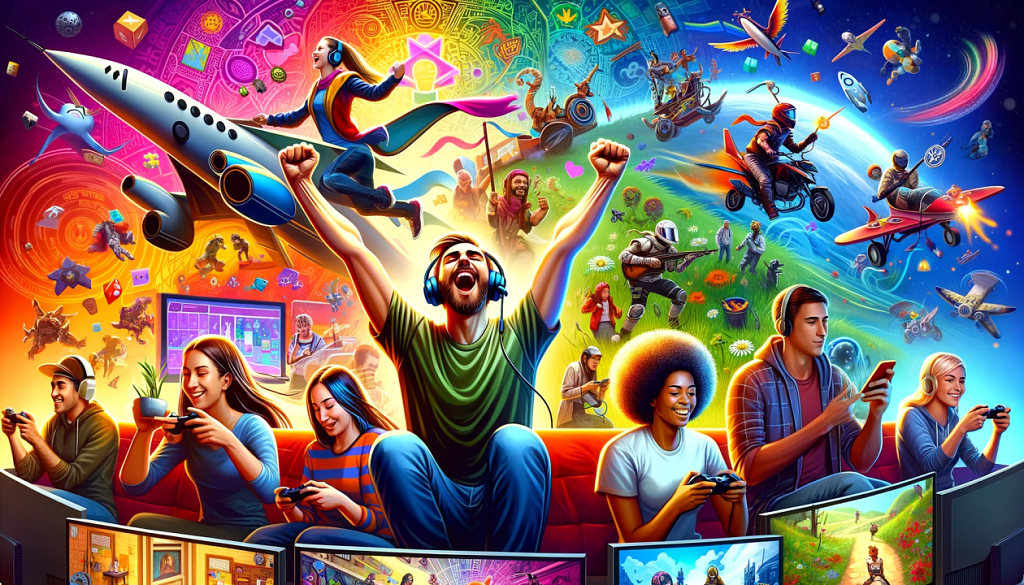Video games have come a long way from their pixelated beginnings. Today, they offer immersive worlds, complex storylines, and engaging gameplay experiences. But beyond the entertainment factor, there’s a growing body of research that suggests video games can have a surprisingly positive impact on mental health and social interaction. Let’s delve into the world of video games and explore how they can benefit our well-being and connect us with others.
Mental Health Benefits: A Gamer’s Advantage
Gaming isn’t just about mindless entertainment. Here are some ways video games can positively influence mental health:
-
Stress Relief and Relaxation: Engaging gameplay can provide a welcome escape from daily pressures. The focus required to navigate virtual worlds or overcome challenges can be a form of mindfulness, promoting relaxation and reducing stress.
-
Cognitive Boost: Many video games require players to think strategically, solve puzzles, and react quickly. These cognitive challenges can help improve memory, focus, and problem-solving skills. Studies suggest games can enhance cognitive flexibility, particularly in older adults.
-
Emotional Resilience: Overcoming challenges and setbacks within the game environment can build emotional resilience. Players learn to cope with frustration, adapt to new situations, and persevere through difficult tasks, translating these skills into real-world situations.
-
Sense of Accomplishment: Completing quests, achieving goals, and mastering skills within games provides a sense of accomplishment. This positive reinforcement can boost self-esteem and motivation, which can spill over into other aspects of life.
-
Combating Anxiety and Depression: Studies suggest that video games can be a helpful tool in managing anxiety and depression. The immersive nature of games can provide a distraction from negative thoughts, while social interaction within games can combat feelings of isolation. However, it’s important to note that video games should not be considered a sole treatment for these conditions; professional help may be necessary.
Social Interaction: Building Bridges in Virtual Worlds
The rise of online gaming has transformed how we interact with others. Here’s how video games can foster social connections:
-
Building Communities: Multiplayer games allow players to team up, collaborate, and strategize with others towards a common goal. These online interactions can foster a sense of belonging and community, especially for those who might struggle with social interaction in real-world settings.
-
Communication and Teamwork: Online games necessitate communication and collaboration. Players learn to work together, communicate effectively, and strategize as a team, fostering valuable social skills.
-
Friendship and Camaraderie: Shared experiences within online games can forge strong bonds and friendships. The virtual world can be a platform to connect with like-minded individuals who share similar interests.
-
Social Support and Empathy: Online gaming communities can provide a space for social support and empathy. Players can connect with others who understand their passion for gaming and offer encouragement or advice.
-
Overcoming Social Anxiety: For those with social anxiety, online gaming can provide a safe space to practice social interaction in a low-pressure environment. Players can gradually build confidence and communication skills that can translate into real-world interactions.

Finding the Balance: Responsible Gaming for Optimal Benefits
While there are undeniable benefits, it’s important to promote responsible gaming habits to maximize the positive impact. Here are some key points to consider:
-
Moderation is Key: Like any activity, excessive gaming can have negative consequences. Set time limits and prioritize other aspects of life like physical activity and social interaction in the real world.
-
Genre Matters: Different game genres offer varying benefits. While puzzle games can boost cognitive skills, social interaction is more prominent in multiplayer games. Choose games that align with your desired benefits.
-
Healthy Habits: Maintain a healthy lifestyle alongside gaming. Ensure proper sleep, eat nutritious foods, and engage in physical activity to complement the mental benefits offered by games.
-
Parental Guidance: For parents, monitoring children’s gaming habits and ensuring age-appropriate content is crucial. Open communication and encouraging other hobbies can promote responsible gaming habits.
Related: Get to Know Ken Kaneki and the Tokyo Ghoul Universe
Conclusion: Rethinking the Narrative
Video games have shed their negative stereotypes and emerged as a powerful tool for promoting mental well-being and fostering social interaction. From stress relief and cognitive enhancement to building communities and overcoming social anxiety, the benefits of gaming are undeniable. By embracing the positive aspects of video games and promoting responsible gaming practices, we can unlock a world of potential for improving our mental health and social connections.



